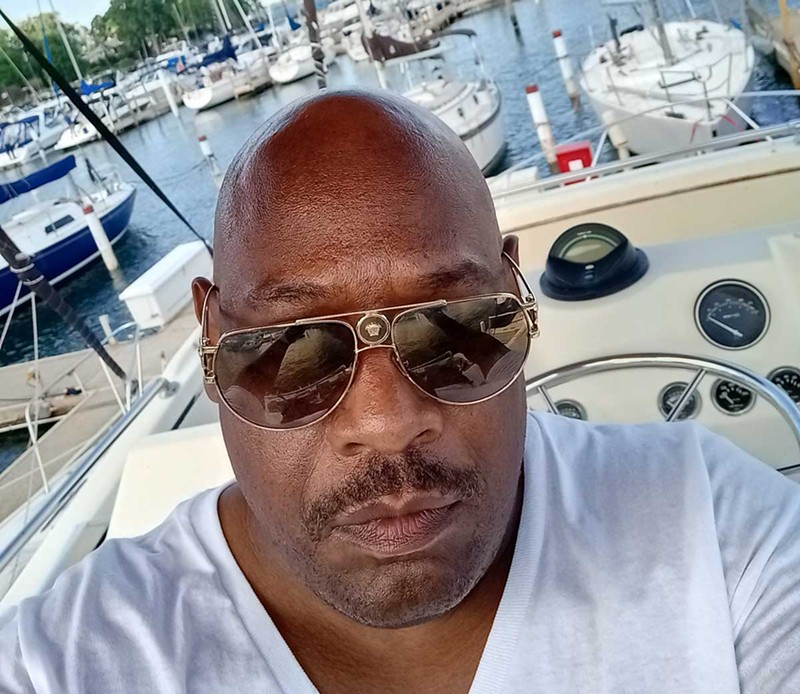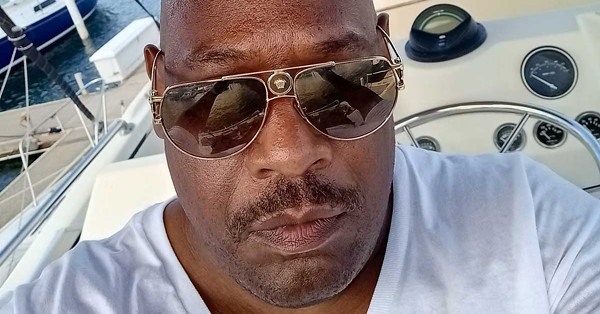
Courtesy photo
Duane Williams awaits the Wayne County Prosecutor’s Office’s decision whether to re-try his case after its Conviction Integrity Unit recommended his release from an Ionia prison in June.
He woke up craving a smoke. It was about 2 a.m. March 5, 2013 when Duane Williams opened his eyes to the darkness of the Inkster home he shared with his wife and family.
In his grogginess he grabbed a cigarette, then searched for a lighter, but never found one. Out of fatigue and frustration, he decided to go back to sleep.
“The next thing I knew, I heard people in the house, calling my name,” recalls Williams, 54.
He was pretty sure the voices belonged to police, but he didn’t know why they were there. Hearing officers walk in one direction, then another, he soon saw “all these guns on me.” His wife Kathy stirred awake, barely comprehending much beyond the sight of deadly weapons. Williams says he surrendered, politely asking the officers to take him from the house, hoping to keep Kathy out of harm’s way.
He remembers being glad he’d stopped looking around for the cigarette lighter instead of accidentally startling the officers he’d never heard come through the door. Coincidentally, smoking appears to have caused the two deaths for which Williams would lose 11 years of freedom, following wrongful murder convictions. Now he awaits the Wayne County Prosecutor’s Office’s decision whether to re-try his case after its Conviction Integrity Unit (CIU) recommended his release from an Ionia prison in June. Williams’s story is one of a growing number of Michigan wrongful convictions being examined by Metro Times.
While Williams knew about the deaths of Bobby Cross, his mother’s longtime boyfriend, and Darryl Simms in a west-side Detroit house fire the previous summer, he says he didn’t know an investigation had led police to his door while he lay asleep.
“They told me they’d been outside so long that one of them had to use the bathroom,” Williams says.
To his surprise, the morning air soon revealed onlookers, street barricades, and police car lights glowing against the blackness over the neighborhood. Before the day ended Williams would learn that Gary Vone Jennings II, a man he casually knew from Williams’s earlier days as a rap artist, told Detroit Police Williams confessed to deliberately setting the fire that killed Cross and Simms. The medical examiner concluded both deaths were accidental after Simms fell asleep on a sofa while smoking.
Despite having argued with Cross the night before the fire, Williams says he harbored no ill feelings toward anyone who was there, and Jennings hadn’t been at the house on Fielding Street, or witnessed anything he could reliably tell investigators.
“He knew no details and they should never have believed him,” Williams says.
In fact, Jennings’s only connection to the entire affair was that he dated a woman related to Cross, CIU would discover in 2024. But a few months after the fire Jennings was arrested for felony bootlegging of audio and video products, an offense for which he was already on probation, court records show.
Now he needed a deal.
“Using jailhouse informants is an incredibly bad practice,” says Maya Menlo, a State Appellate Defender Office (SADO) attorney who represented Williams.
Not only did Jennings lie, in hopes of gaining leniency after his arrest, but he was paid a $5,000 reward, following the trial, according to SADO’s investigation in collaboration with CIU and Western Michigan University’s Cooley Law School Innocence Project.
Williams says the help Menlo and SADO gave him felt like the first real legal support he’d received, since his trial lawyer and defense investigator didn’t listen to him. He was convicted September 10, 2013.
“It hurt to see that so many lies were being told and nobody was working to find out that the things being said weren’t true,” adds Williams.
Part of the problem, Menlo says, is that the full truth had never been made available. For example, a report and photographs of a Zippo-style lighter discovered near the fire’s point of origin were not made available to the defense team, as required by the so-called “Brady rule” requiring that prosecutors share information that could support a defendant’s innocence.
“The CIU review revealed that there were multiple Brady violations, and the primary witness was an informant who did not come forward with the information in the case until he was placed in custody,” says Maria Miller, Wayne County Prosecutor’s Office spokesperson. “Once the CIU review was completed, Prosecutor [Kym] Worthy recommended that a grant of relief be given.”
Also withheld from Williams’s defense team was an interview contradicting the claims made by Jennings, Menlo adds. Jennings and Williams had met at a promotional event years ago when Williams pursued a rap career, using the stage name Diablo (Spanish for “devil”).
“I used to always tell people, ‘I’m a nice guy,’” he says. “For some reason, people in my neighborhood gave me that nickname when I was 13 years old, and it stuck.”
As Diablo he recorded with the likes of the Detroit group D12’s Swifty McVay, but he traveled to unlikely destinations like Grand Junction, Colorado to perform for money, Williams says. He also drew support from recording artist T-Pain, but by the time of his arrest Williams had settled down and been married for a year. He says he’d served an earlier prison sentence, also based on false testimony, and traveling out of state had led him to violate parole. He embraced a simpler life with Kathy and her little ones who became his stepchildren.
“I loved being responsible, doing homework with the kids and walking them home from school, taking them on trips,” he recalls. “I was becoming a family man.”
The fire investigation disrupted his entire life. Since his release from prison he says he’s “working on” his marriage and he was recently hired by an organization that investigates cases of the wrongfully convicted.
“I don’t want anybody to forget about any of them, because there’s more work that needs to be done,” he says.
Attorney Todd Flood, who will represent Williams late this month when the Wayne County Prosecutor’s Office determines whether to exonerate or charge Williams a second time, agrees.
“There is so much to address here about how this happened, and to do our best to make sure it never happens again,” says Flood.
Like Menlo, who is “hopeful that the prosecutor will do the right thing,” Flood’s optimistic: “I’ve gone through every nook and cranny of this case and, from what I can see, there’s no way I can imagine in my wildest dreams that this case is ever going back to trial.”
He’ll also represent Williams in a civil case, seeking compensation for the years he spent in prison, says Flood.
“It’s all hard work,” he adds, “and there are people on the other side who are not going to be willing to make Duane whole without being held accountable.”
Meanwhile, Williams says he’s grateful.
“I thank Prosecutor Worthy for starting the Conviction Integrity Unit. I thank Ms. [CIU Director Valerie] Newman for doing what she does, but the safest thing for me to say is everybody has to have ‘integrity.’ Everybody has to do their job correctly,” he adds. “There shouldn’t be a need for a CIU.”
Menlo says there’s a “really easy way to address” the withheld evidence issue that leads to countless wrongful convictions, “and that’s to adopt an open file policy.”
Defense attorneys could visit the prosecutor’s office to examine the complete evidence file and then ask questions, unlike the current system in which prosecutors share information at their sole discretion, Menlo says.
While Williams says he’d be glad to see improvements in the legal system, he recognizes that he still has personal challenges. Menlo, Flood, and Flood’s staff members like Isaias Cruz have all been a godsend, he adds, and Williams even enjoys time on his uncle’s boat, but trauma haunts his freedom.
“You would think that you get out of jail and it’s a party from then on, but that’s when you have your problems,” he says. “I keep crying. I don’t have good control over my emotions.”

